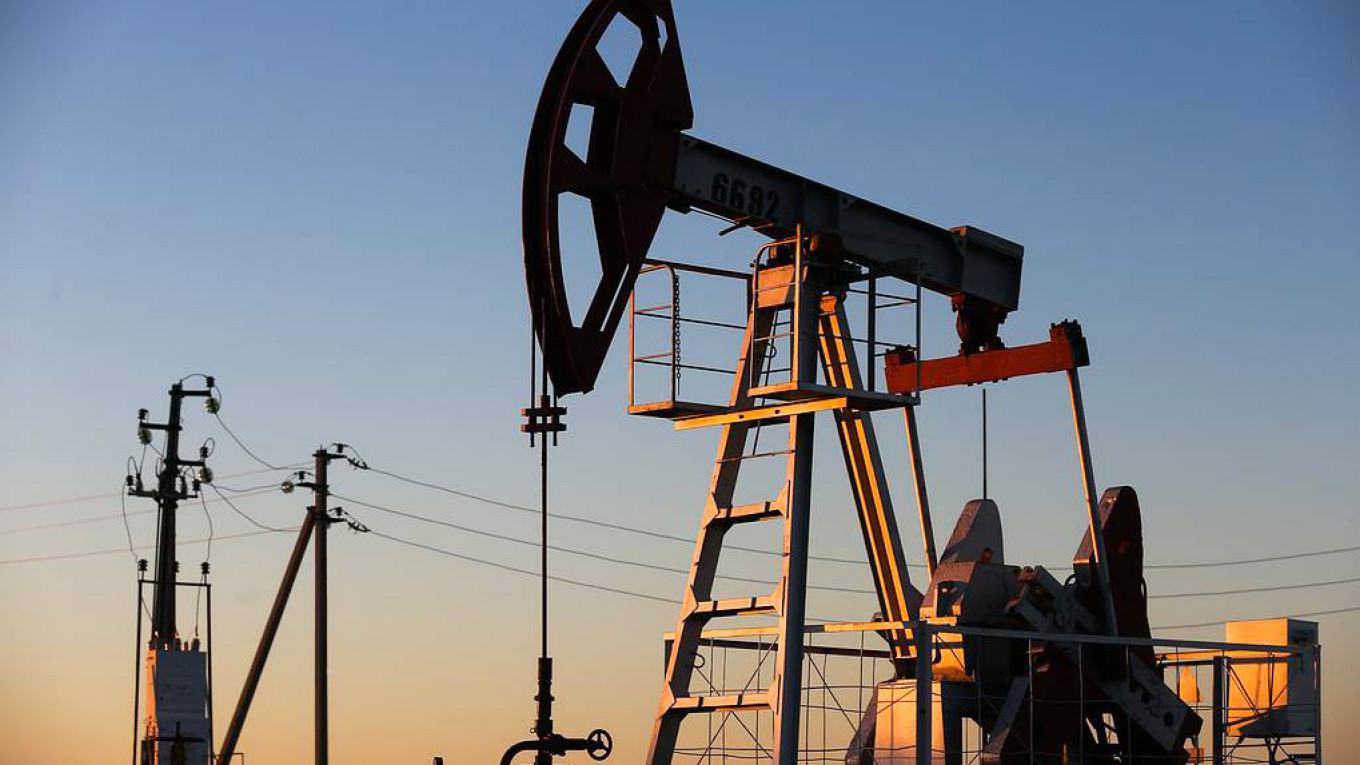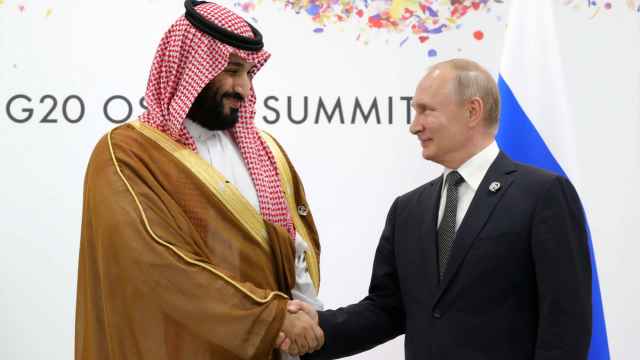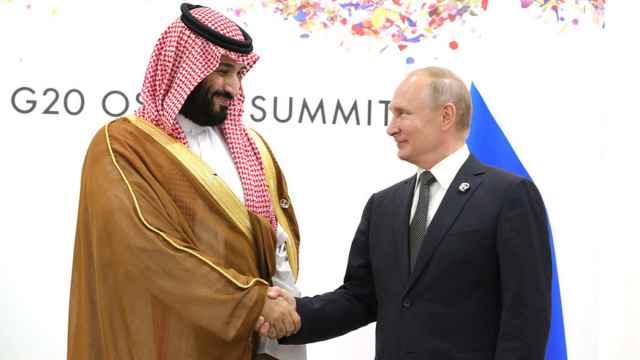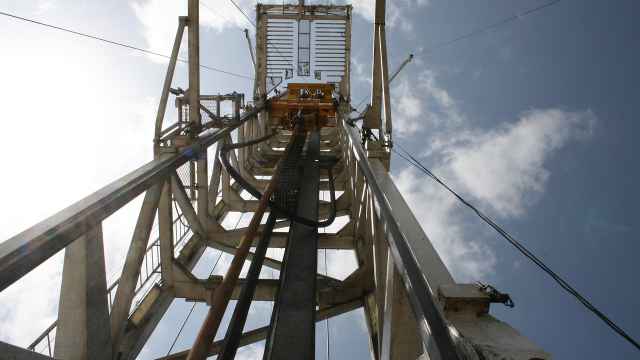Oil prices plummeted this week after a stalemate in talks between Russia and the Organization of the Petroleum Exporting Countries (OPEC). Convinced it can force OPEC members to unilaterally decrease production, Russia may well end up worse off than its rivals in its bid to save face.
Saudi Arabia–led OPEC and Russia had been in negotiations to reduce oil output in response to falling oil prices caused by the warm winter and the coronavirus outbreak, the latter of which has led to a worldwide decrease in oil consumption due to canceled flights and temporarily shuttered enterprises in China.
Russia depends heavily on hydrocarbon production taxes and needs the price of oil to stay above $45 per barrel to keep its budget balanced; Saudi Arabia, to support its target deficit of 7 percent, needs it to be around $47.50 to $50. The difference, then, is not large, and it might seem that the best option would have been to reach an agreement to reduce production in a coordinated fashion so as to stabilize prices. But the Russian side chose confrontation.
On March 13, a barrel of Brent or of West Texas Intermediate crude oil was trading at $32–$36, a decrease of more than 30 percent from the prior month. That price drop is inflicting far greater and more immediate damage on Russia than the production reduction sought by OPEC would have.
Officially, Russia’s reason for refusing to reach an agreement was that a sharp fall in the oil price would knock debt-saddled U.S. producers of shale oil out of the game. However, that reasoning fails to take into account an elementary fact: Shale oil production can easily be wound down and boosted again. U.S. producers will simply leave the market while prices are low and return as soon as they increase.
Accordingly, the players who will lose out are those who sell their oil at low prices for the next six or twelve months. The United States will easily weather a reduction in oil production: The oil and gas industry accounts for roughly 8 percent of U.S. GDP, and the sector is responsible for only 10 percent of its growth rate. Meanwhile, hydrocarbons account for twice as much — 15 percent — of Russia’s GDP, and the correlation between Russian GDP growth and oil price is almost 99 percent. It’s obvious that Russia will lose a lot more in the short term and won’t gain anything in the long term either.
Moreover, if the fall in oil prices coupled with the coronavirus epidemic leads to a recession in the United States, the reelection this fall of U.S. President Donald Trump, whose position on Russia is not exactly hard-line, would suddenly look far from certain. A victory for his Democratic rival — whether former vice president Joe Biden or Senator Bernie Sanders — would mean much tougher U.S. policies against Russia, including harsher sanctions. It’s doubtful that Russian authorities wish to see that.
Russia might just be bluffing to force Saudi Arabia to unilaterally reduce production. The Saudis are certainly in a worse position in terms of balancing their budget, but their production costs are significantly lower than Russia’s. They also have 2.5 times as much oil in their reserves as Russia does, so it makes sense for them to extract it and sell it at practically any price as long as there is demand for oil. Riyadh has already announced increased production.
Finally, unlike Russia, Saudi Arabia has influential friends (the United States, in particular) and can increase its borrowing at a very low cost. The two countries have similar budget reserves in excess of $500 billion each. But Russia is home to 144.5 million people compared with Saudi Arabia’s population of 33.7 million. Not only can Riyadh dramatically decrease its budget, but it also can afford to run a budget deficit for many years: Its reserves, loans, and friendship with the United States will see it through.
Russia does not have those same advantages. It cannot significantly increase the production of oil, its economy wasn’t growing even when oil cost $60 per barrel, the pension fund is running a deficit, and household incomes are lower now than eight years ago. The sanctions in place on Russia foreclose the possibility of large-scale external borrowing even when oil prices are high. If Saudi Arabia decides to raise the stakes, Russia — where the authorities’ ratings are already falling — will have to throw in the towel or suffer a long-lasting recession and yet another decrease in household incomes.
It’s possible that Russia will choose to fight until the bitter end. The Kremlin is accustomed to using force as a prelude to negotiations and typically refuses to make face-saving concessions.
Russia’s oil industry will indeed suffer with less funding for the development of technology and exploration. Yet this may not be such a bad thing if it forces Russia to diversify its economy and develop other industries.
Living standards will fare less well because the oil price impacts the ruble’s exchange rate directly. With a falling ruble, imports will become more expensive, hurting both consumers and manufacturers, as most inputs for domestic production are still being bought abroad.
The ruble’s fall will also hit Russian people’s savings (which are mostly held in rubles). In 2019, a record number of investment accounts were opened, and retail investors invested in the recovering Russian stock market. Now those savings will be worth a lot less. (By March 10, the Russia Trading System Index had fallen 34 percent from its local maximum on Jan. 20.)
Given that household consumption consists heavily of imported goods, the ruble’s fall will force the public to buy fewer goods and services, including those originating in Russia. That will damage Russian businesses, which are already fragile.
Provided next winter is colder and the worst of the coronavirus epidemic has passed, oil consumption could again increase. The oil price likely could have rebounded if the OPEC countries had been able to coordinate their actions. But war — even a price war — always means destruction and loss.
This war will benefit economies that import oil, above all China and Europe. They will be greatly helped by low prices, especially given the fall in manufacturing activity caused by the coronavirus pandemic. The biggest losses likely will be sustained by small oil-exporting countries, from Azerbaijan to Yemen, which have yet to fully recover from the last major drop in oil prices in 2014. Saudi Arabia and Russia will also be hurt — and none of the oil-producing players will gain.
Even if the pessimistic prognoses for the spread of a pandemic do not come true, there is no chance Russia’s GDP will grow in 2020 — unless the state statisticians work their magic on the figures. Right now, one thing is clear: This year will be much worse than expected, especially for ordinary people and optimistic investors.
This article was first published by the Carnegie Moscow Center.








